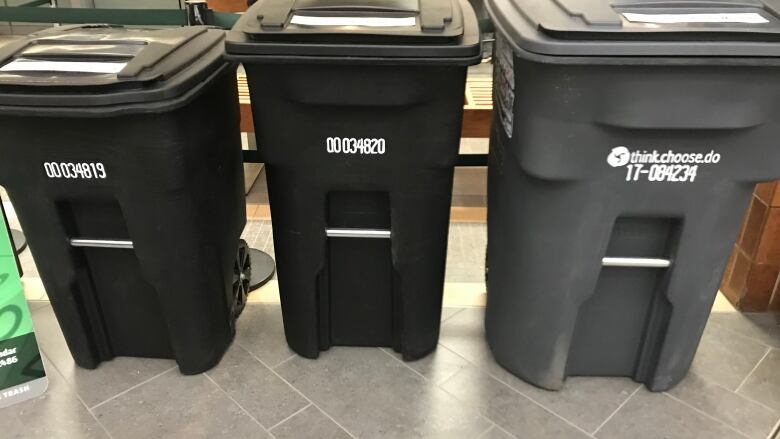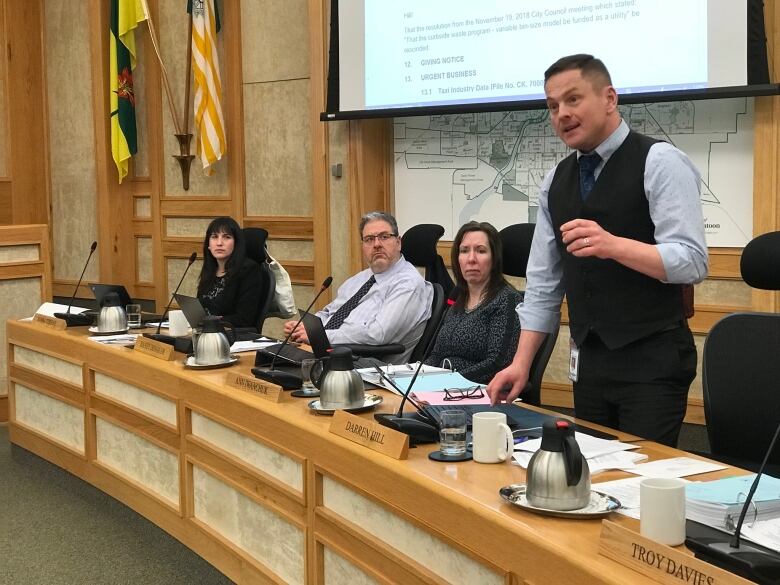Garbage flip-flop makes city council look divided and erratic: Saskatoon prof
'One wonders how it came to this,' says Saskatoon political studies professor Joe Garcea

Saskatoon city council looks "divided" and "erratic" after reversing course on a key element of a plan to transform the city's garbage collection system, says a University of Saskatchewan political studies teacher.
"Council continues to be very divided on this," JoeGarcea said the day aftera central feature of the city's pay-as-you-throw garbage program was scrapped.
On Monday, council voted 6-5 to reverse its previous decision made only a month ago to charge monthly user fees for garbage collection. All it took was councillor Darren Hill switching his vote. All other councillors' positions remained the same from a month ago.
-
For the reversal: Troy Davies, Randy Donauer, Ann Iwachuk, Zach Jeffries, Bev Dubois, Darren Hill (6).
-
Against the reversal:Hilary Gough, Charlie Clark, SarinaGersher, Cynthia block, Mairin Loewen(5).
Garceasaid theswift policy reversal week appeared "erratic."
"It's a puzzle," he said. "One wonders how it came to this and why it became so confusing and why it became so politicized and ultimately even cost a member of staff at city hall her job."
Opening the door to second-guessing
Garcea expressed concern about how Monday's decision looks in the eyes of the public.
"It's giving the impression that perhaps city council is not humming along as comfortably and as well as they think that it should," he said.
Garceasaid the reversal sets a precedent, "for better or worse."
"People will say, it ain't over until it's really over," he said. "And therefore I think what it might do is might encourage a lot more lobbying for changes to decisions."

Hill cited several reasons for switching his vote. He said the system of tying fees to bin sizes was flawed because people would not be charged based on how much garbage they actually have in their bins.
He also questioned the belief that creating a new landfill necessarily means having to relocate it.
Citing conversations with the provincial government, Hill said there might be room expand the current dumpsite.
Dan Willems of the city said the majority of the estimated $100 million cost of building a new cell would remain, regardless of whether it was built near the current dump or not.
'Just more delays'
On a more practical level, Monday's decision to go back to the drawing board on garbage collection means "just more delays" on the city's lagging garbage record, said Sheri Praski, a consultant who used to oversee the city's garbage and recycling programs.
Praski, like many others, notedSaskatoon trails behind many other similar-sized cities in terms how much waste it diverts from its landfill.
"This was a strategy to move us in the right direction and so it's just another setback," said Praski.
Pay-as-you-throw, meant to launch in early 2020, was supposed to help the city reach a waste diversion goal of 70 per cent by 2023.
Despite Monday's setback, revamping the program by early 2020 is still possible, said Praski.
"With the current mindset, it's going to be pretty hard to get there," she said. "Hopefully at some point there will be a wake up call and they'll just be like, 'Let's move forward' and they'll do it."
A re-election year
2020 happens to be same year that Saskatoon city councillors will be up for reelection.
Garcea said he thinks the issue of garbage collection will remain dormant until the election, at which point some people may point to it as "an indication of a problem at city hall."
By axing for the moment the idea of garbage collection being funded as a utility, councillors effectively keptto the status quo, which is paying for the service via property taxes.
Severalcouncillorspointed out Monday night that decision did not come without a cost.
A 4.7% property tax hike?
The cost of a city-wide organics program combined with the need to make up for continued operating losses in the city's waste division plus the cost of a potential new landfill could increase property taxes by 4.7 per cent in 2020, according to the city.
The plan under pay-as-you-throw was to cover that cost through the utility.
Councillor Mairin Loewen pointed out Tuesday that, with the utility out the window, "council will now need to find a way to cover the costs while, in my opinion, trying to minimize the tax impact on residents."
Loewenvoted in favour ofpay-as-you-throw both last month and on Monday.
"The property tax model brings an increase with no new program options or performance advantages," she said.












_(720p).jpg)


 OFFICIAL HD MUSIC VIDEO.jpg)
.jpg)



























































































